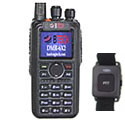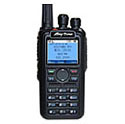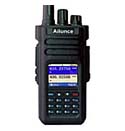Product Review
NanoVNA
Vector Network Analyzer
50kHz to 900MHz

John 'Miklor' K3NXU
Oct 2019 / Nov 2020
|
What is a VNA?
The first thing to note is that this is not a toy. The NanoVNA is a full function Vector Network Analyzer. It's primary function is to measure antenna and cable parameters such as SWR, Cable Loss, Impedance, etc. as well as the tuning filters. If you like building or verifying the performance of your antennas beyond a simple SWR bridge, this is something you may want to consider for your test bench. What's in the Box - The NanoVNA unit - (3) Calibration terminations Short, Open, and 51 ohm - (2) 13" (33cm) cables * - (1) SMA-F to SMA-F adapter - (1) 39.5" (1m) USB to USB-C charge / program cable - (1) 400 > 500mAh Battery * * On some units, cables and batteries are optional
Description / Specifications - Bandwidth - 50kHz to 900MHz - Display - option 1 - 2.8" TFT (320x240) Touch Screen - Display - option 2 - 4.3" TFT (800x480) Touch Screen - Interface - USB > USB type C - RF output - -13dBm - Accuracy - <0.5ppm - Scanning Points - 101 (fixed) - Display Tracking - 4 - Display Marking - 4 - Setting Save - 5 Review The NanoVNA is ideal for the average antenna builder. I use this little gem to verify the performance of my handheld antennas and well as base station. Previously to check the SWR of a mobile antenna, I would use a handheld programmed for about a dozen or so frequencies, run it through an SWR bridge and take individual readings to verify the antenna was properly tuned. Now, at the flick of a switch, I can see the entire spectrum. If you are tuning a mobile antenna, you can see the results live as you change the antenna length.
The initial 'out of the box' setup and Calibration is a simple process and takes about two minutes. Add-Ons Although the NanoVNA comes with pretty much everything you need to get started, there are a few add-ons that you will probably find useful. - An SMA-M to SMA-M adapter. May be needed to test various handheld antennas - An inexpensive stylus. The NanoVNA has a touch screen. I've got large fingers and a stylus makes selections a lot easier. - Reading glasses (optional). The LCD is a 2.8", and although the display is clear, the characters are very small. There is also a 4.3" LCD at additional cost. Capabilities Charts include: Smith, LogMag, Phase and VSWR for both S11 and S21. Software There is also some excellent software available adding PC power to the NanoVNA. This takes the NanoVNA to a whole new level. This is available at Github and NanoVNA Saver
A 10 page user guide that includes basic operation, calibration instructions, schematic, etc can be found Here. It is a translation from Chinese to English, but does describe the initial setup. A Must Read A excellent detailed online guide to the NanoVNA calibration, operation and measurements can be found at NanoVNA Manual Conclusion There's a lot of power in this little box. I've had mine for a while now and for a low cost network analyzer, I am more than satisfied. There are several set up and How To videos available on YouTube. This is a Must Have for your test bench. Note 1: With some units, the battery and cables might be optional. I highly recommend ordering one with the optional battery that provides about 2 hours use between charges. Note 2: They have recently introduced the NanoVNA SAA-2N. It's not quite as 'Nano' as the original, as this workhorse has a 4.3" screen, Type-N connectors, carry case. Note 3: This equipment was purchased by me. This is a fair and unbiased review. All findings are factual based on the equipment I received.
|
TOP of PAGE
Miklor Home
Miklor Home
BTECH  DMR6X2 PRO Dual Band (Review) Anytone  D878UV II+ Dual Band (Review)  D578UV Series Mobiles Hotspot  SkyBridge MAX (Review) Ailunce  HD1 / GPS (Review) Amplifiers  BTECH DMR Amps UHF VHF (Review) Repeaters  Ham / GMRS Commercial Repeaters Duplexers |






